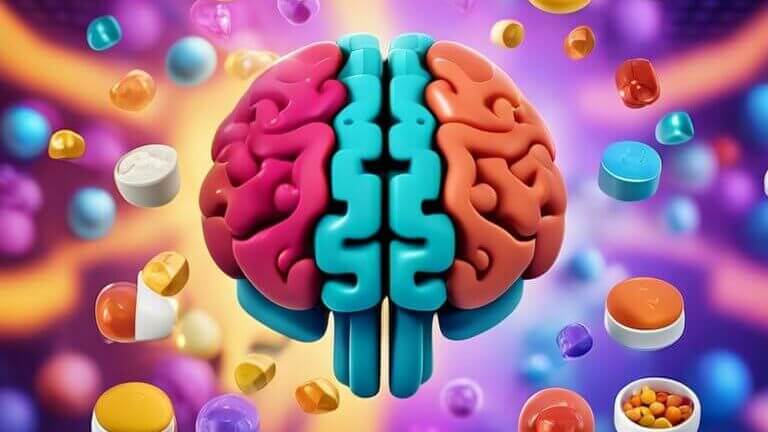With the rising popularity of nootropics in cognitive enhancement, it is crucial to consider their mood-related effects as well. These cognitive enhancers have the potential to not only enhance mood but also pose risks of mood swings if not used properly.
For individuals interested in the emotional and psychological aspects of these supplements, especially those with mood disorders, understanding how to use them safely is paramount.
In this informative post, we will examine the mood-altering potential of nootropics, highlighting both their positive benefits and potential dangers to empower you with the knowledge you need to make informed decisions.
The Science of Mood and Brain Chemistry
Neurotransmitters and Emotions
On the grand stage of our brain, neurotransmitters take the spotlight as the conductors of our emotions. Serotonin, dopamine, and norepinephrine are the key players in this enthralling performance, orchestrating feelings of happiness, motivation, and arousal.
In individuals with mood disorders, such as depression or anxiety, there is often an imbalance or dysfunction in these neurotransmitters, leading to shifts in mood and emotional stability.
Understanding this delicate dance between brain chemistry and emotions is crucial in exploring the mood-altering potential of nootropics.
How Nootropics Interact with Brain Chemistry
Brain chemistry is a symphony of intricate interactions, with each note playing a crucial role in our overall cognitive and emotional well-being.
In the matter of nootropics, these cognitive-enhancing supplements have the potential to positively impact neurotransmitter levels, boosting cognitive function and mood.
However, it’s vital to tread cautiously in this realm, as imbalanced neurotransmitter levels can lead to adverse effects, such as mood swings or heightened anxiety.
Another layer to consider is the individual variability in how nootropics interact with brain chemistry. While some may experience positive effects, others may be more prone to adverse reactions due to differences in their neurochemistry.
The Mood Enhancement Potential of Nootropics
Common Nootropics for Mood Enhancement
Some individuals turn to nootropics in search of a boost in mood and cognitive function. Popular choices include herbs like St. John’s Wort and Ashwagandha, as well as synthetic compounds like L-theanine and Phenibut. These substances are believed to promote a sense of well-being and overall positivity.
Possible Mechanisms of Action
Enhancement in mood through nootropics is thought to occur through various mechanisms. Some compounds may increase the levels of serotonin and dopamine in the brain, neurotransmitters that play a crucial role in regulating mood. Others may reduce levels of cortisol, the stress hormone that can contribute to feelings of anxiety and depression.
Risks and Side Effects
Once again, it’s crucial to acknowledge that while nootropics have the potential to enhance mood, they also come with risks and side effects.
One particular concern is the risk of mood swings and emotional instability when using certain nootropics. This can manifest as sudden shifts in mood, from euphoria to irritability or even feelings of depression.
The Risk of Mood Swings and Emotional Instability
When plunging into the world of nootropics, it’s important to be mindful of the potential for mood swings and emotional instability. While some individuals may experience mood enhancement, others might encounter the opposite effect. It’s vital to monitor your emotional well-being closely and discontinue use if you notice any concerning shifts in mood.
Guidelines for Safe Use of Nootropics
For individuals seeking to explore the mood-altering potential of nootropics, following guidelines for safe usage is paramount. Moderation and informed decision-making are key.
Start with low doses, observe how your body reacts, and gradually increase if necessary.
Consulting with a healthcare professional is recommended, especially if you have a history of mood disorders or are taking other medications that may interact with nootropics.
It’s vital to prioritize your well-being when incorporating nootropics into your routine. Keeping track of your mood and emotional state, staying informed about potential side effects, and seeking professional guidance can help ensure a safe and positive experience with these cognitive enhancers.
Personalizing Nootropic Use for Mood Regulation
Tailoring Nootropics to Individual Needs
Needs vary from person to person when it comes to mood regulation through nootropics. Each individual’s brain chemistry is unique, requiring a tailored approach to find the right balance.
It’s crucial to consider factors such as pre-existing mood disorders, genetic predispositions, and overall health when selecting and dosing nootropics.
Monitoring and Adapting Nootropic Use
With the potential mood-altering effects of nootropics, it’s imperative to regularly monitor and adapt your usage for optimal results.
Keeping a mood journal can help track changes, identify patterns, and determine which nootropics work best for you.
Consulting with a healthcare professional or a mental health practitioner is also highly recommended to ensure safe and effective usage.
Summing up
From above, it’s clear that nootropics have the potential to influence mood in various ways. They can enhance positivity or trigger mood swings.
For individuals intrigued by the emotional and psychological impacts of these cognitive enhancers, understanding their effects on mood and utilizing them safely is crucial.
Whether you’re seeking mood enhancement or considering nootropics for managing mood disorders, it’s imperative to approach their use with caution and awareness of potential risks.
Staying informed, monitoring your mood closely, and consulting with healthcare professionals can help you navigate nootropics while safeguarding your emotional well-being.







